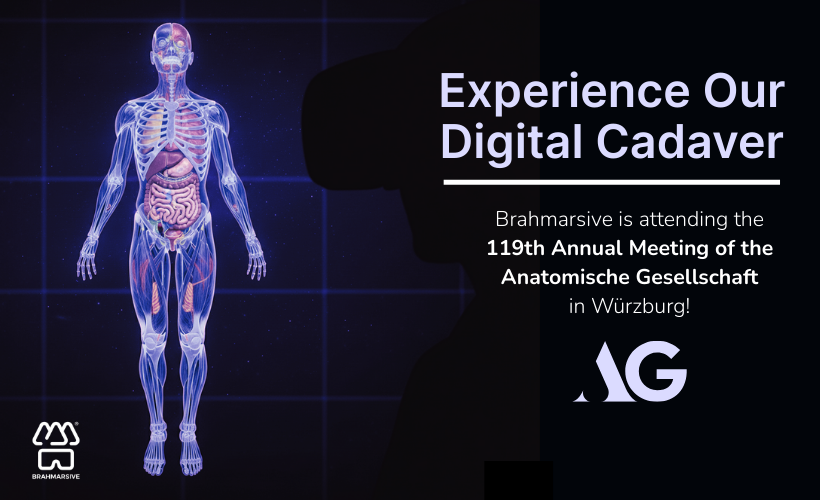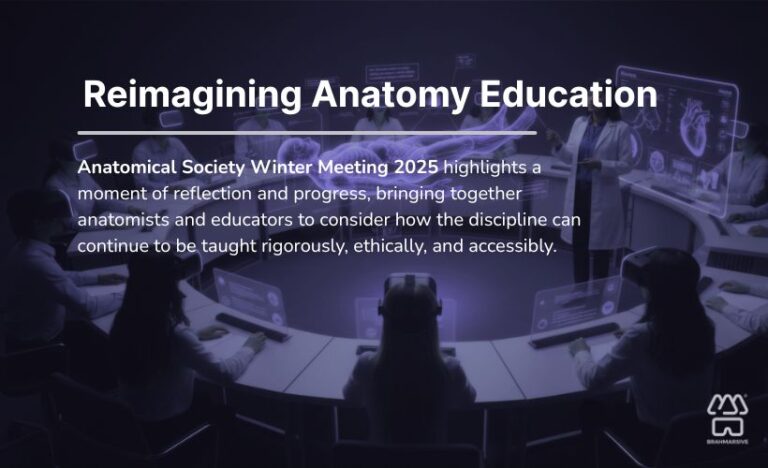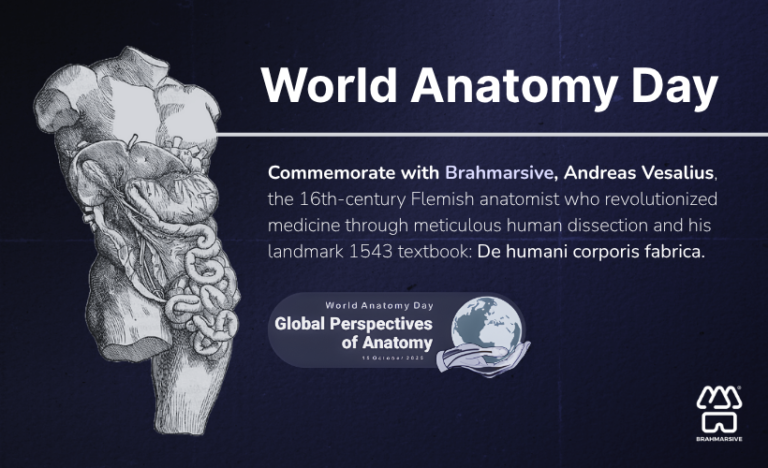University of Würzburg | September 24–26, 2025
Come meet our team in person! Demo our Digital Cadaver through Brahmarsive’s VR Platform at the 119th Annual Meeting & 35th Working Conference of the Anatomical Society.
Innovation in Anatomy Education
Every year at the Anatomical Society Conference, renowned researchers and educators, from across Germany and abroad, gather together to exchange thought provoking ideas that pioneer new reforms within higher education and the healthcare industry.
This year follows suit, with discussions surrounding ethics, educational reforms, and the most recent discoveries in anatomy. Furthermore, the team at Brahmarsive is honored to attend and meet the brilliant minds that shape anatomical education and research as we showcase our VR based Digital Cadaver.
How AR/VR Platforms Support Higher Education Digitalization
Professors at German Universities nevertheless continue to play a crucial role in shaping future generations of healthcare professionals. Conferences such as the Anatomical Society’s annual meeting highlight the importance of keeping curricula current with modern challenges. However, as research evolves, so must educational systems.
Consequently, with 2027 approaching fast, the Hospital Future Act (KHZG) continues it’s push for a modernization of Germany’s healthcare system. Moreover, many universities are beginning to integrate digital health topics into their curricula in an effort to match a growing demand for digitally skilled professionals. This includes preparing students to work with new digital tools and technologies, such as virtual reality.
Subsequently, Brahmarsive’s platform bridges this need and help institutions adapt quickly by offering a ready-to-use toolkit that aligns with evolving standards in medical education.
Brahmarsive’s Immersive Learning Platform
Brahmarsive hosts a SaaS platform that encourages hands-on learning with limitless parameters. By utilizing virtual and augmented reality, we can provide educators with tools to build their personalized lessons from readily provided assets in our 3D Marketplace.
Alternatively, collaborate with our team to create specialized learning experiences to suit your needs. Above all, we strive to foster a stimulating environment that makes it convenient and simple for professors to track student engagement and understanding of the material through simulated medical scenarios.
Tools like the Digital Cadaver are a way for educators to provide 1-on-1 student access to anatomical study via cadavers. This tool offers a chance at revision on a more advanced level. Whilst Brahmarsive does not aim to replace traditional cadaver study, it can enhance medical education through immersive VR technology.
Why VR Anatomy Education Matters
Research highlights the urgent need for digitalization in medicine. A 2022 study (Sorg, Ehlers, & Sorg, 2022) found that German medical students are not yet fully prepared for the digital future of healthcare, emphasizing the importance of VR anatomy education in bridging this skills gap.
Universities are responding:
-
University Hospital Würzburg has implemented STEP-VR, a virtual emergency room simulation for student training and exams.
-
University Hospital Bonn (UKB) leverages VR surgical visualization tools like Medicalholodeck to prepare students and doctors with immersive learning.
-
Heidelberg University Medical School reports strong student and faculty interest in AR-based cardiovascular training (MDPI, 2025).
These initiatives align with the KHZG’s push for modernization, ensuring tomorrow’s medical professionals can thrive in a digitally transformed healthcare system.
Sources:
Sorg, H., Ehlers, J. P., & Sorg, C. G. G. (2022). Digitalization in Medicine: Are German Medical Students Well Prepared for the Future?. International journal of environmental research and public health, 19(14), 8308.
Medica Tradefair (2024). Virtual Reality in Medical Education: Emergency Simulations.
Immersive Learning News (2023). Harnessing VR Technology to Transform Medical Care.
Schlegel, P. P., Kehrle, F., Bugaj, T. J., Scholz, E., Kovacevic, A., Grieshaber, P., Nawrotzki, R., Kirsch, J., Hecker, M., Meyer, A. L., Seidensaal, K., Do, T. D., Schultz, J.-H., Frey, N., & Rahm, A.-K. (2025). Augmented Reality in Cardiovascular Education (HoloHeart): Assessment of Students’ and Lecturers’ Needs and Expectations at Heidelberg University Medical School. Applied Sciences, 15(15), 8595.







